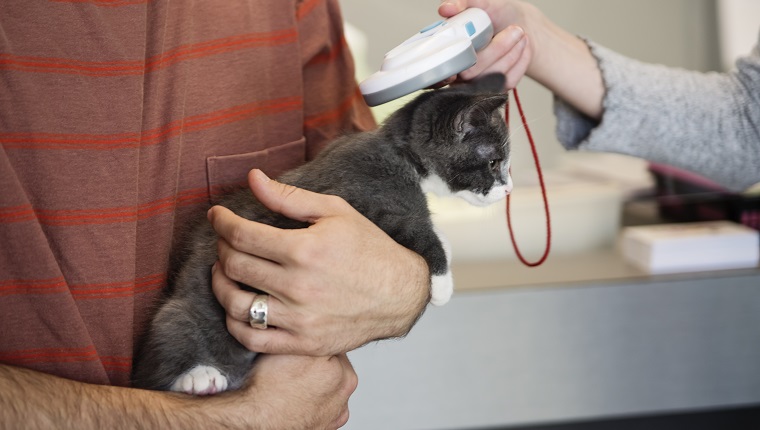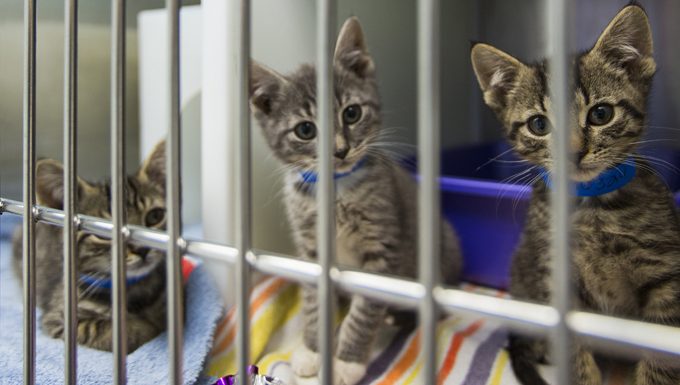Ways You Can Help Homeless Cats During Adopt A Shelter Cat Month
-
Visit Your Local Shelter's Website

(Picture Credit: Cheglakov Eugene/Getty Images)
Take a look at the available animals and volunteer opportunities on your local animal shelter's website. They'll have plenty of resources to help you get involved.
Check to see they have a wish list. They often have a link somewhere to a wish list of items they are in need of.
Whether you wish to donate old blankets or purchase pet food, anything you can give will be much appreciated by your feline friends.
-
Get Involved

(Picture Credit: Nikola Stojadinovic/Getty Images)
Become a volunteer, and spend some time cleaning cages, feeding, playing with, or simply snuggling a shelter cat.
If you reach out to local shelters and rescues, they will be happy to put you to work. Let them know what interests you and what you are able or willing to do. They need you and the work is the most rewarding work you'll ever do.
Even if you can't directly volunteer with the shelter, you can still hold fundraisers with your work, school, church, team, or other group. Bake sales and car washes never go out of style!
-
Share Homeless Cats On Social Media

(Picture Credit: SBenitez/Getty Images)
You can like or follow local shelters and rescues on social media, then share their posts about cats in need, and help spread the word to your friends and family.
Who knows? You might just help find a cat their forever home without ever logging off your computer.
-
Foster A Homeless Cat

(Picture Credit: Yuga Kurita/Getty Images)
Fostering a cat is always a great option if you are unable to commit to a forever cat. It's a fantastic opportunity to see how your current pet or pets might react to a new member of the family.
Also, if finances are an issue, the rescue often pays for all the medical expenses of your foster cat, as well as food and supplies for their foster animals. So, you wouldn't incur many financial responsibilities if any.
If you go on vacation, the rescue will help find a cat sitter or move the cat into a new foster home. It really is a carefree cat companion option for those who aren't sure they can handle the obligations of permanent cat parenting.
-
Educate Your Children

(Picture Credit: portishead1/Getty Images)
If you have kids, it's never too early to teach them about responsible pet parenting.
Teach them about why it's important that all cats be spayed and neutered, and help them to get involved volunteering or raising money to donate to shelters and rescues.
They will learn by watching you, so bring them with, if possible, to your volunteering events.
Kids also love learning cat facts, so share some with your youngster. Here's a list of our favorite cat facts to share with kids!
-
Help A Neighborhood Stray

(Picture Credit: Wanwisa Jantida / EyeEm/Getty Images)
Maybe you have noticed a stray cat in your neighborhood. You can look up a trap-neuter/spay-return program near you, also known as TNR.
If you reach out to rescues in your area, someone may be able to help with this. It'll help keep the cat populate in your neighborhood from going through the roof.
Then you can put out water and food for the stray kitty to make sure that they always have fresh water and food.
-
Educate Others

(Picture Credit: Kiyoshi Hijiki/Getty Images)
Help educate others on the importance of Adopt A Shelter Cat month and kitten season, and share about how they can help.
Sharing articles like this one with educational information on social media can help get the word out to others about how important it is to spay and neuter and to always adopt a cat from a reputable shelter or rescue.
Did you rescue a cat? Share your story online. It really helps to raise awareness.
-
Microchip, Spay, & Neuter All Of Your Pets

(Picture Credit: martinedoucet/Getty Images)
The best way to keep animal populations down is to spay and neuter all of your animals. Encourage friends and family to do so as well.
Make sure all of your pets have proper identification tags and microchips. That way if they get scared by 4th of July fireworks -- which will be here before you know it -- they won't end up in a shelter.
Microchipped pets have a much better chance of being returned promptly to you for the added love and support they're going to need after a traumatic event like that.
-
Donate

(Picture Credit: vejaa/Getty Images)
The simplest and easiest way to help homeless cats and kittens in your area, if you can afford it, is to donate money to a reputable rescue or shelter. It really is the best way to help next to adopting.
You may also be able to donate items, some of which you probably already own, to your shelter. But call ahead first to see what they need.







